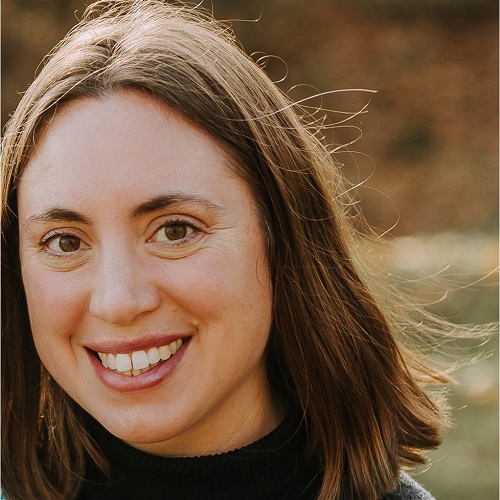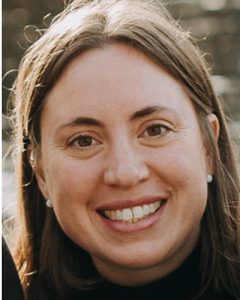Helping solve scientific puzzles is Dr. Lori Borgal’s passion, and her love of the hunt for knowledge is a big part of what she hopes to share with students as Assistant Professor, Biology, at Mount Saint Vincent University.
Motivated by research
“One of the key things in research is being able to take a little piece of this puzzle and call it your own and run with it and try to figure out how it works. There’s so much to figure out. It’s limitless,” she says. “That’s one of the really exciting things for me – the opportunity to have students come in and be able to ask questions and find out answers – things that nobody else has found out before. That’s certainly a motivating factor in research and that’s the kind of experience I want to give the students at MSVU.”
 Having joined the university in July 2020, Lori has been hard at work teaching virtual classes in cell biology and genetics while also preparing her research lab (during a pandemic, no less!) so she can continue her research and engage others in learning how to do their own.
Having joined the university in July 2020, Lori has been hard at work teaching virtual classes in cell biology and genetics while also preparing her research lab (during a pandemic, no less!) so she can continue her research and engage others in learning how to do their own.
“I’m really looking forward to having the space and capacity to delve into my research questions and to involve some of the undergraduate students who wish to get hands-on research experience as well,” she says. “I’ve been primarily doing research for many years of my career and I’m bringing a lot of that work with me. I have projects that are up and running and we can hit the ground running as soon as we get the lab space organized.”
Most recently, Lori has been exploring stem cell mitotic spindle formation using Drosophila melanogaster – better known as fruit flies – as a research model.
“I look at how stem cells divide,” she says. “Using Drosophila, I look at the different developing regions –the brain, or the testes, or the gut. Fruit flies are very, very useful in research because you can alter protein expression and then live-image the developing larvae to visually observe what happens during stem cell mitosis in real-time; this is something that is more difficult technically in mammalian models.”
International experience and inspiration
Having gained substantial experience working in large research facilities while completing her Ph.D. at the University of Cologne, Germany and while participating in a Royal Society Newton International Fellowship at the University of Exeter, UK, Lori is ready to take the next steps of her career at MSVU. She says there are many important lessons she will carry with her from those she has worked with along the way.
Among the mentors who have provided her with inspiration and support is her Ph.D. supervisor, Dr. Bernhard Schermer of Nephrolab Cologne at the University of Cologne. She credits him with inspiring her to return to science after she encountered him in Germany while on a break from studies following her master’s degree.
“He’s very passionate about what he does, and he shares that passion with people,” she says. “He really inspired me to be passionate about my research and to share that passion. That’s one thing I hope to do as a prof as well – to inspire people to look more closely. Once they understand how these things work – how these molecular machines work – it’s fascinating that all these things can happen at the same time and create an organism, a person, a tree, whatever have you, and, to me, it’s awe-inspiring that it actually works when there are so many things that could go wrong.”
Lori also expresses appreciation for the exploration encouraged byJames Wakefield at the University of Exeter and her Royal Society fellowship for helping her develop critical skills. “He taught me a lot about Drosophila, but more than that he said, ‘Here are my facilities and you can use them,’ which gave me the freedom to develop my ideas,” she says, adding: “The Royal Society also sent me on a lot of what we called ‘soft-skill’ workshops that are just critical for understanding how to navigate the science world, how to manage a lab, how to do all these other things that go beyond the fundamental research.”
Setting an example
Believing the same opportunities should be available to anyone who is willing to put in the necessary work, regardless of gender, Lori appreciates the significance of being a woman working in science – particularly at a university like MSVU, with its focus on the advancement of women and girls.
“I do look forward to being a role model as a female scientist who’s reached the level of having an independent lab and who has the ability to do international quality research. That’s hopefully setting an example for the younger generation that this is a viable career option and a very interesting career option,” she says.
Lori says she didn’t grow up wanting to be a scientist, adding it was instead a natural evolution of her curiosity about how things work with her path becoming clear as she progressed through her education. But, she says, having a mother who had a career as an analytical chemist provided inspiration. Now, as the mother of two young daughters herself, Lori says she hopes to show them that all things are possible with dedicated effort – but they will need to choose for themselves what their futures hold.
“I want them to understand that you get what you work for – it doesn’t come for free and you have to put the time in – but then the sky’s the limit. You can be what you want,” she says.
She emphasizes the importance she places on achieving work-life balance, saying that what she has achieved in her career so far has been made possible, in part, through her strong partnership at home.
“Being a mom with two small kids in any job has challenges and I’m so lucky I have a very supportive husband. We give each other the space and time to progress our goals and if it weren’t for having a partnership like that, I think it would be very challenging,” she says.
Coming full circle
 Originally from Halifax, Lori completed her M.Sc. in Anatomy and Neurobiology and B.Sc. (Honours) in Neuroscience at Dalhousie University. She feels fortunate to have made her way back to the place where she spent most of her childhood.
Originally from Halifax, Lori completed her M.Sc. in Anatomy and Neurobiology and B.Sc. (Honours) in Neuroscience at Dalhousie University. She feels fortunate to have made her way back to the place where she spent most of her childhood.
“I think I’m incredibly lucky to come home to my hometown because many people don’t get the chance to do that,” she says. “With the foundation that I got here in Halifax, I was competitive in Europe, eligible for a Royal Society fellowship, and then able to come back here and then establish my own lab. I feel like I have a chance to give back in a way because I can take new students and teach them how to be independent, how to think for themselves, and how to set up their CV in a way that puts them on a very good footing.”
Lori says she’s delighted to be at MSVU and she appreciates the institution for its special qualities as a smaller university with a focus on what matters most.
“I see this as a great opportunity to be exactly where I want to be – somewhere that lets me explore this area of research and work closely with students.”
![]() We’re advancing research, scholarly work and professional activity. Learn more about this MSVU Strategic Plan Theme »
We’re advancing research, scholarly work and professional activity. Learn more about this MSVU Strategic Plan Theme »